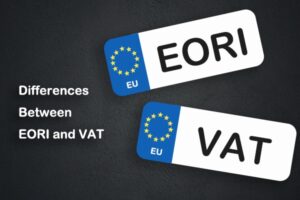In the world of international trade and commerce, acronyms like EORI and VAT may appear daunting, but understanding their significance is crucial for businesses engaged in cross-border activities. In this article, we’ll demystify the differences between EORI (Economic Operators Registration and Identification) and VAT (Value Added Tax), shedding light on their distinct roles in the business landscape.
EORI: Your Passport to International Trade
1. Purpose:
- EORI (Economic Operators Registration and Identification): EORI serves as a unique identifier for businesses involved in international trade. Its primary purpose is to facilitate customs procedures and ensure efficient monitoring of goods crossing borders. Essentially, it’s your business’s passport to international trade.
- VAT (Value Added Tax): VAT, on the other hand, is a consumption tax levied on the value added to products or services at various stages of production and distribution. VAT aims to collect taxes from consumers, making it a tax on the final consumption of goods and services.
2. Regulatory Authority:
- EORI: EORI numbers are issued and managed by customs authorities in individual countries or regions. Customs agencies are responsible for administering the EORI system and ensuring that businesses comply with customs procedures.
- VAT: VAT is typically managed and collected by tax authorities at the national or regional level. Tax authorities oversee VAT compliance, including registration, reporting, and payment.
3. Usage:
- EORI: EORI numbers are primarily used for customs declarations, import/export documentation, and other customs-related activities. They help identify businesses engaged in cross-border trade and ensure accurate customs procedures.
- VAT: VAT is applied to the sale of goods and services. Businesses collect VAT from customers and remit it to the tax authorities. It affects a wide range of businesses and consumers, as it is a tax on the final consumption of goods and services.
4. Applicability:
- EORI: EORI is primarily relevant for businesses engaged in international trade, including importers, exporters, customs agents, and logistics companies.
- VAT: VAT applies to a broader range of businesses, including those involved in domestic and international trade, as well as service providers. It affects both businesses and consumers and has a more extensive reach.
5. Geographic Scope:
- EORI: EORI numbers are specific to individual countries or customs unions, such as the European Union. Businesses involved in international trade obtain EORI numbers from the customs authorities in the specific region where they operate.
- VAT: VAT systems exist in many countries worldwide, and the rules and rates can vary significantly from one country to another. Businesses operating in multiple countries may need to register for VAT in each country where they have a tax obligation.
In summary, EORI and VAT serve distinct purposes within the realm of international trade and taxation. EORI is a customs identifier, focusing on facilitating and monitoring cross-border trade, while VAT is a consumption tax applied to the sale of goods and services, affecting both businesses and consumers. Understanding the differences between these two identifiers is essential for businesses operating in international markets to ensure compliance and smooth operations.
